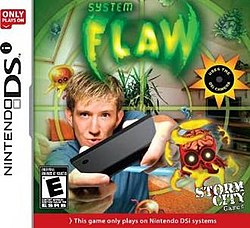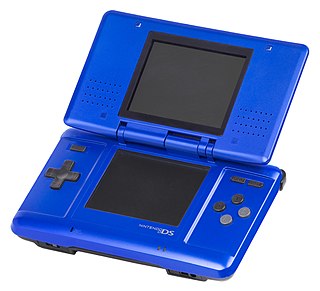
The Nintendo DS is a handheld game console produced by Nintendo, released globally across 2004 and 2005. The DS, an initialism for "Developers' System" or "Dual Screen", introduced distinctive new features to handheld games: two LCD screens working in tandem, a built-in microphone and support for wireless connectivity. Both screens are encompassed within a clamshell design similar to the Game Boy Advance SP. The Nintendo DS also features the ability for multiple DS consoles to directly interact with each other over Wi-Fi within a short range without the need to connect to an existing wireless network. Alternatively, they could interact online using the now-defunct Nintendo Wi-Fi Connection service. Its main competitor was Sony's PlayStation Portable during the seventh generation of video game consoles.

Mario's Cement Factory is a 1983 LCD game developed and published by Nintendo under their Game & Watch series. It follows earlier Mario games, like the arcade and Game & Watch versions of Donkey Kong. Players control Mario as he navigates elevators and funnels cement through a factory, while trying to prevent the cement from crushing his fellow workers. Two versions of the game were released — a Table Top unit and a handheld game akin to most other Game & Watch titles. Development was headed by Nintendo R&D1, led by engineer Gunpei Yokoi.

Nintendo Wi-Fi Connection was an online multiplayer gaming service run by Nintendo to provide free online play in compatible Nintendo DS and Wii games. The service included the company's Wii Shop Channel and DSi Shop game download services. It also ran features for the Wii and Nintendo DS systems.
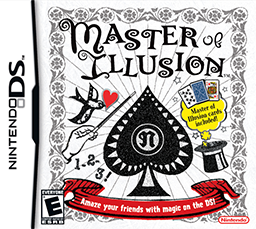
Master of Illusion, known in Europe as Magic Made Fun: Perform Tricks That Will Amaze Your Friends! and in Japan as Magic Encyclopedia, is a magician video game for the Nintendo DS. It was developed by Tenyo and Eighting and published by Nintendo, released in Japan on November 16, 2006, November 26, 2007 in North America and March 14, 2008 in Europe. Around 9 of its magic tricks were released as separate pieces of DSiWare.
WiiWare was a service that allowed Wii users to download games and applications specifically designed and developed for the Wii video game console made by Nintendo. These games and applications could only be purchased and downloaded from the Wii Shop Channel under the WiiWare section. Once the user had downloaded the game or application, it would appear in their Wii Menu or SD Card Menu as a new channel. WiiWare was a companion to the Virtual Console, which specializes in emulated games originally developed for other systems instead of original games.

The Nintendo DSi is a dual-screen handheld game console released by Nintendo. The console launched in Japan on November 1, 2008, and worldwide beginning in April 2009. It is the third iteration of the Nintendo DS, and its primary market rival is Sony's PlayStation Portable (PSP). The fourth iteration, entitled Nintendo DSi XL, is a larger model that launched in Japan on November 21, 2009, and worldwide beginning in March 2010. Development of the DSi began in late 2006, and the handheld was unveiled during an October 2008 Nintendo conference in Tokyo. Consumer demand convinced Nintendo to produce a slimmer handheld with larger screens than the DS Lite. Consequently, Nintendo removed the Game Boy Advance (GBA) cartridge slot to improve portability without sacrificing durability.
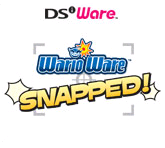
WarioWare: Snapped! is a minigame compilation party video game developed by Nintendo SPD Group No.1 and Intelligent Systems and published by Nintendo for the Nintendo DSi's DSiWare digital distribution service, and is part of the WarioWare series of video games. It is the sixth game in the series. It was released for Nintendo's DSiWare service, which started at the launch of the DSi on April 5, 2009 in North America.

Picopict, known as Pictobits in North America and as Pictopict in Australia, is a puzzle video game developed by Skip Ltd. and published by Nintendo for the Nintendo DSi's DSiWare digital distribution service. It is one of seven games released for the DSi's Art Style series of video games. It was announced on January 26, 2009, was released two days later alongside Somnium, another Art Style game, and was released in North America and PAL regions in the same year, on May 18 and May 22 respectively. In Picopict, players use the touchscreen to move coloured blocks into a formation, such as a four-block line or a 2x2 square. This contributes to an 8-bit image, which consist of various Nintendo Entertainment System (NES) characters, such as Mario, Link, and Bowser.
Brain Age, known as Dr Kawashima's Brain Training in PAL regions, is a series of video games developed and published by Nintendo, based on the work of Ryuta Kawashima.
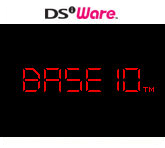
Code, known as Base 10 in North America and Decode in Japan, is a puzzle video game developed by Skip Ltd. and published by Nintendo for the Nintendo DSi's DSiWare digital distribution service.

Nemrem, known as Zengage in North America and Somnium in Japan, is a puzzle video game developed by Skip Ltd. and published by Nintendo for the Nintendo DSi's DSiWare digital distribution service.

Mighty Flip Champs! is a puzzle-platform game, developed and published by WayForward Technologies for the Nintendo DSi's DSiWare digital download service. It was first announced on March 9, 2009, and was released on June 1, 2009 in North America and on November 27, 2009 in the PAL regions. The developers took inspiration from multiple sources, including the video games Wendy: Every Witch Way and The Legend of Zelda: A Link to the Past. In it, players control Alta, a girl who has to reach a fishman by flipping between areas until she can reach him. Since its release, Mighty Flip Champs! received all-around positive reception, while also being called one of the best video games for the DSiWare service. It is the first game in the Mighty series, and is followed by Mighty Milky Way, Mighty Switch Force!, and Mighty Switch Force! 2.

Dragon Quest Wars is a turn-based strategy video game developed by Intelligent Systems and published by Square Enix for the Nintendo DSi via the systems's DSiWare download service. It is part of the Dragon Quest series and features monsters from the series. It supports up to four player multiplayer, both local and online. Dragon Quest Wars was announced on May 18, 2009, and was released in Japan on June 24, 2009, in North America on September 28, 2009, and in the PAL regions on October 9, 2009.

The Nintendo DSi system software is a set of updatable firmware versions, and a software frontend on the Nintendo DSi video game console. Updates, which are downloaded via the system's Internet connection, allow Nintendo to add and remove features and software. All updates also include all changes from previous updates.

Art Academy, also known as Art Academy: Learn painting and drawing techniques with step-by-step training in the PAL regions and Artistic Taste Classroom DS in Japan, is an art training software for the Nintendo DS handheld game console. It was developed by Headstrong Games, and published by Nintendo. Art Academy was originally a two-part training application only available for download via the DSiWare service since 2009. It was later re-released in 2010 as a fully compiled, retail-able DS Game Card with added features, thus also making it available for original Nintendo DS and Nintendo DS Lite users.
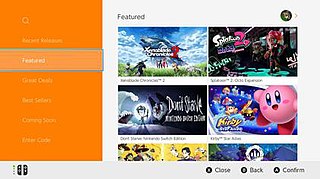
The Nintendo eShop is a digital distribution service powered by the Nintendo Network for the Wii U and Nintendo 3DS, and by a dedicated online infrastructure for the Nintendo Switch. Launched in June 2011 on the Nintendo 3DS, the eShop was enabled by the release of a system update that added the functionality to the Nintendo 3DS's HOME Menu. It is the successor to both the Wii Shop Channel and DSi Shop. Unlike on the Nintendo 3DS, the eShop was made available on the launch date of the Wii U, although a system update is required in order to access it. It is also a multitasking application, which means it is easily accessible even when a game is already running in the background through the system software, though this feature is exclusive to the Wii U and the Nintendo Switch. The Nintendo eShop features downloadable games, demos, applications, streaming videos, consumer rating feedback, and other information on upcoming game releases.
